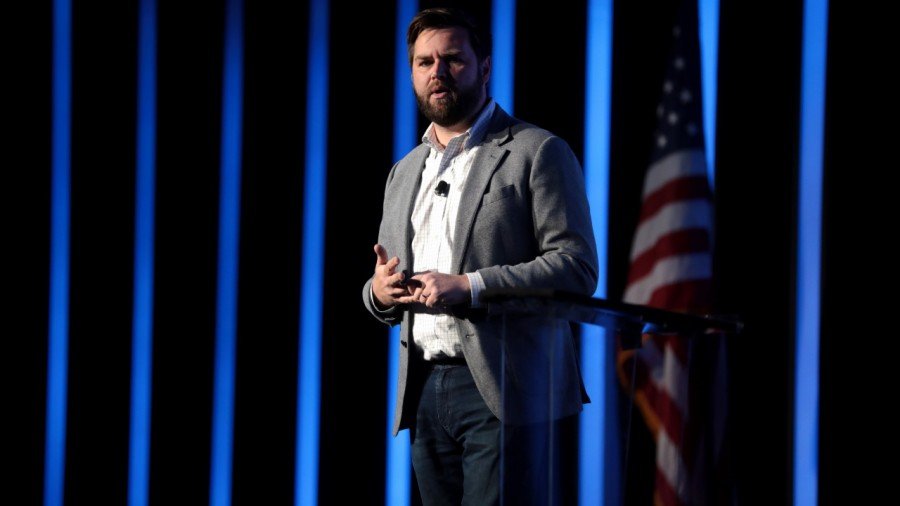The New American Theocrats
On the morning of May 3rd, Sohrab Ahmari was dealing with blowback. The New York Post’s Iranian-born opinion editor had tweeted a message in support of Chinese global leadership, writing that he was “at peace with a Chinese-led 21st century” because “Late-liberal America is too dumb and decadent to last as a superpower.” He also praised Chinese civilization itself, writing that it would “possess a great deal of natural virtue” while exerting economic, cultural, and military power upon the rest of the world.
Prominent figures from both the left and right criticized Ahmari for the tweet. He later deleted it, but still argued that his wife was born in China, and he thus did not need to be reminded that the country is currently engaged in one of the most significant ethnic cleansings in a generation.
It wasn’t the first time Ahmari had ruffled the feathers of both liberals and conservatives more moderate than he. In 2019, the editor publicly criticizedNational Review’s David French for advocating on behalf of individual autonomy and argued for a more brutal method of exerting moral influence on his opponents, writing that:
“Progressives understand that culture war means discrediting their opponents and weakening or destroying their institutions. Conservatives should approach the culture war with a similar realism. Civility and decency are secondary values. They regulate compliance with an established order and orthodoxy. We should seek to use these values to enforce our order and our orthodoxy, not pretend that they could ever be neutral.”
Ahmari’s statement, and French’s response to it, culminated in a debate wherein the two rehashed the same points discussed in their respective pieces, Ahmari whacked French with ad-hominem barbs about the legitimacy of his military service, and French yelped “How dare you?” before Ross Douthat, the visibly exasperated moderator, put a stop to the spectacle.
The debate’s lack of clarity may have been irrelevant. Writing in The American Conservative, John Askonas, a professor at the Catholic University of America, noted that “all of the Millennials and Gen Zers I talked to instinctually agreed with Ahmari.” Quoted in the New Yorker, Ahmari seemed to realize that he had already won the minds of the conservative youth, even before he took the stage.
“What sparked all of this is a generation of young conservatives — and I’m not the only one; I’m part of an ecosystem — that is trying to kill off some of the older generation’s ideas,” he said.
Defending a Despot
Notably absent from the evening’s points of discussion was Ahmari’s past support for Viktor Orbán, Hungary’s despotic prime minister.
Under the pretense of the coronavirus, Orbán’s Parliament has handed himthe right to rule by decree indefinitely, suspended all legislative processes, and halted reelections. Ahmari has repeatedly defended or even praised Orbán’s handling of the country’s coronavirus crisis, even writing acomplimentary piece in the pages of the New York Post calling for “Western elites [to] stop lecturing Hungary” on democracy and trumpeting denials of authoritarianism from Hungarian Foreign Minister Péter Szijjártó.
Before the coronavirus, however, Orbán and Ahmari’s cultural and political views were seemingly already in alignment. Orbán has long argued for a more “illiberal” form of Christian Democracy in Hungary, called for strict crackdowns on migration in accordance with his “procreation, not immigration” platform, placed anti-immigration messaging in school textbooks, cracked down on non-governmental organizations critical of his government, and more.
And while Ahmari has repeatedly exhibited defensiveness in the face of criticism of Orbán, he is not alone. Rather, he is one of an increasing number of Catholic right-wing anti-pluralists currently climbing the ladders of American governmental, cultural, and legal power, whose beliefs bear a striking resemblance to that of Orbán and may find a home within the Republican Party’s increasingly populist, power-driven ranks.
So-called integralists like Ahmari are primarily concentrated on returning a Catholic ideal of virtue to American culture. They count among their numbers opinion writers, Ivy League professors, politicians, and a swarm of young conservatives following their leads. They stand brash, for drastically increased government might and seek to use the levers of the state to benefit those who act according to their dictates as well as punish those who do not.
The Becoming of J.D. Vance
Another such member is J.D. Vance. But a few years ago, Vance was the left’s token interpreter of the Trumpist right. He had penned a bestselling book about his childhood in the poverty-stricken Rust Belt and made frequent appearances on mainstream and left-leaning cable news segments explaining to perplexed liberals why people like those who raised him would vote for such a man as Donald Trump, despite assurances that he found Trump distasteful.
Today, however, Vance seems to have made a sudden about-face, casting himself as a bulwark against the “ruling class” while preparing to run for the Ohio Senate seat soon to be vacated by Senator Rob Portman. Were he to be elected to the Senate, Vance would arrive as one of the body’s most outspoken and controversial members.
It may work for him. Of all the declared and potential candidates, Vance is the most well-known nationally, a factor that, in American politics’ cable news controversy-driven fundraising landscape, could work to his advantage. Vance now toes the line on nearly all aspects of Trump’s platform, including disdain for Big Tech discrimination, a hawkish view of immigration, and support for punishing businesses that move operations abroad.
In recent months, Vance has ratcheted up his rhetoric. At a May meeting of the Claremont Institute’s Center for the American Way of Life, Vance outlined his view of the role of government as an institution that is obligated to act against those who contradict it.
“If you’re fighting the American nation-state, if you’re fighting the values and virtues that make this country great,” Vance declared, “then the conservative movement should be about nothing if not reducing your power and, if necessary, destroying you.”
In another interview with Rod Dreher, a friend of Vance’s and a noted supporter of Orbán, Vance said that his “views on public policy and what the optimal state should look like are pretty aligned with Catholic social teaching.” Moreover, Vance has shown support for Orbán’s “Family Policy Successes” online.
Selfish “Personal Rights”
Others extend Vance and Ahmari’s virtue-focused viewpoint to the legal system, upsetting one relative constant among conservative thought leaders: the question of how to interpret the Constitution.
Originalism, perhaps the most predominant principle behind mainstream conservative constitutional thought, holds that a judge’s duty is to interpret the Constitution based upon what the founders meant when they penned them, regardless of the mercurial applications of those words today. For generations, conservative thought leaders espoused this methodology as most faithful to the founders’ intent and sharply condemned so-called “judicial activism” as unfaithful to the country’s guiding principles.
The principle played a crucial role in the election of Donald Trump to the presidency. He delivered on his promise to appoint conservative judges in a big way, nominating three staunch originalists to the nation’s highest court, and hundreds more to federal benches across the country.
Catholic Americans supported Trump in these endeavors in numbers not seen in a generation. His vocal opposition to abortion, however novel the sentiment was for him, won him widespread support even from reluctants, and it seemed that, in Trump’s Originalist Supreme Court picks, conservative Catholics had secured a lifelong protectorate for their belief system.
But the integralists aren’t satisfied. Originalism, they argue, is too permissive of secular practices (Scalia himself rejected the notion that the Supreme Court had the authority to ban abortion) and, in its place, they propose a new brand of “Common-Good Constitutionalism” that seeks a new role for the American courts: that of authoritative rule, and the ability to crush those who oppose their values.
Common-Good Constitutionalism, as outlined by Adrian Vermeule of Harvard Law School, is an attempt to enshrine that which benefits the Catholic ideal of the common good in law. Vermeule doesn’t think highly of liberal values like personal rights and argues that the state must have the ability to usurp the wishes of the individual in cases such as healthcare, should the result appear to benefit the majority.
“Elaborating on the common-good principle that no constitutional right to refuse vaccination exists, constitutional law will define in broad terms the authority of the state to protect the public’s health and well-being, protecting the weak from pandemics and scourges of many kinds — biological, social, and economic — even when doing so requires overriding the selfish claims of individuals to private ‘rights,’” Vermeule wrote, a day after Orbán solidified his ability to rule by decree indefinitely.
The Republican Party’s Reversal
Vermeule, Ahmari, and Vance’s apparent wariness of individual autonomy marks a significant diversion from the Republican Party’s overwhelming tolerance of the actions of its last successful presidential candidate.
In 2015, it seemed that the GOP had done away with the moralism that had defined its platform for generations. Many of the same voices that had elevated such men as Pat Buchanan and Jerry Falwell to the heights of cultural power and relevance had reversed course, arguing that Donald Trump’s previous infidelity and other unsavory behaviors were not, in fact, disqualifying and that through him, Christians could reclaim a measure of cultural power lost in the years following Falwell and Buchanan’s decline in notoriety. The latter count, at least, came to pass: Trump ushered in a new era of populism that likely could not have succeeded without the support of American Christians and has now paved a path for the likes of Ahmari, Vance, Vermeule, Dreher, and others to bring their message to the masses.
The dissemination of this message has begun to a large measure of success. In addition to the audiences afforded to members of this group by their posts at leading American newspapers and magazines such as the New York Post, Newsweek, and, on the conservative side, The American Conservative, as well as at Harvard and other leading universities, they also boast followings in the hundreds of thousands online, and have written several chart-topping books. For his part, Vance has considerable tailwinds behind his potential campaign, like a $10 million investment from Silicon Valley mogul Peter Thiel and the support of conservative media heavyweights like Tucker Carlson.
However, members of this cadre have not always been a part of the religious far-right. Despite his commitment to Catholic social teaching as the correct foundation for Western society, Vance “joined the resistance” only two years ago. Vermeule and Ahmari only converted to Catholicism in 2016. And only a year after that, a more temperate Ahmari wrote, in an article titled “The Terrible American Turn Toward Illiberalism,” against the “illiberal fever gripping American conservatives” in the neoconservative Commentary Magazine.
“Under Trump, however, some in the party of the right have abdicated their responsibility to liberal democracy as a whole. They have reduced themselves to the lowest sophistry in defense of the New Yorker’s inanities and daily assaults on presidential norms. Beginning when Trump clinched the GOP nomination last year, a great deal of conservative “thinking” has amounted to: You did X to us, now enjoy it as we dish it back to you and then some. Entire websites and some of the biggest stars in right-wing punditry are singularly devoted to making this rather base point. If Trump is undermining this or that aspect of liberal order that was once cherished by conservatives, so be it; that 63 million Americans supported him and that the president “drives the left crazy” — these are good enough reasons to go along.”
The Public Square
At the time, like many of his like-minded peers, the Orbán-defending Ahmari had not yet taken shape. Ahmari had undergone several significant conversions before then, first from reluctant Muslim, then to atheist and writer at the Communist Worker’s Party’s self-published newspaper, Equity, and, finally, op-ed editor at the Wall Street Journal. But when that era passed, and Ahmari had fully metamorphosed, his newest persona made its most consequential moves to date: flacking for a despot in the pages of the Post, urging Americans to rethink what it means to be free, and mainlining Orbánesque ideals of state-influenced cultural regulation, including promoting a lopsided enforcement of the First Amendment and advocating for the government to enforce Catholic orthodoxy.
“Some god, some authority will always be enshrined in the public square. The only question is which,” Ahmari told Tucker Carlson on Carlson’s web series. “….And what we’re seeing now is… the conservative movement relinquished being willing to not only say what the orthodoxy is, but also enforcing it.”
“So you’re saying the Libertarian ideal is not workable, it’s a lie… You’re getting an orthodoxy, whether you like it or not,” Carlson responded. “It’s not enough to say, ‘you believe what you believe; I believe what I believe.’ One of our views is going to be forced on the other guy.”
“The past two years have utterly destroyed the idea of a neutral public square,” Ahmari responded. “There’s just no way.”







